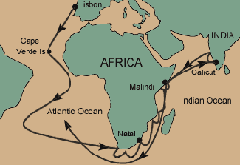Cochin Jews under Portugese rule
By Shalva Weil
On May 20, 1498, Vasco da Gama arrived on India's western shore in Calicut, India (now known as Kozhikode). This was the beginning of Portuguese domination in south India, which aimed at winning over converts to the Roman Catholic church, as well as controlling the profitable spice trade in south India. In 1524, Vasco da Gama became the Viceroy of Portuguese India.
When Vasco da Gama left the coast of Malabar on the way back to Europe, he was greeted in Goa by a Jewish traveler born in Poland, who had traversed Jerusalem and Alexandria, and been taken as a slave in Goa. Vasco da Gama took him captive and forcibly converted him to Catholicism in Lisbon, giving him the name Gaspar da Gama. On a return expedition to south India, Gaspar da Gama married a Cochin Jewess, who refused to be converted.
In 1504 the Portuguese captured the port of Cranganore, named Shingly by Jews and Christians, and looted the houses and shops of the Jews and Moors. Many of the Jews who had made Cranganore their hometown for many centuries considered this the destruction of their holy town and left that town and settled at Cochin and the surrounding areas, where there was already a Jewish population and more than one synagogue in the vicinity: the Cochangadi synagogue, by way of example, had been established in 1344.The last Jews probably left Cranganore in 1565-1566. Today, the Muziris Heritage Project has identified Cranganore (Kodungallor) as the legendary Roman port of Muziris. To this day, the Cochin Jews sing melodies according to Shingli rites.
The Rajah of Cochin welcomed the Jews fleeing from Cranganore and allotted them land near his palace in Cochin. This is the place where you can visit today the Jew Town.
In 1568, the Paradesi built the famous synagogue at the end of Synagogue Lane in Old Town, which you can still visit.The ranks of the Paradesi community in Cochin were swelled by the advent of Spanish and Portuguese Jews escaping the Inquisition, and others, though the Paradesi were never more than 200 people.
During the Portuguese period, the Paradesi Jews consolidated their power. In 1619, the Mudaliar (leader) of the Paradesi, Levi, signed a document as "ambassador of the King of Cochin", issued by the Procurator of the Crown and Treasury of the King of Portugal, negotiating a safe passage to the island of Mocha for a ship belonging to the Rajah of Cochin.
In the New Town of Cochin the Portuguese the Jews were accused of "blasphemous writings." New Christians, many of whom were originally Jewish, were arrested in 1557. Three years later in 1560, the Inquisition was instituted in Goa, and Jews and New Christians were imprisoned, tortured and even killed. In southern India, the Christians were prohibited from business with Jews, and the Jews were threatened, but in practice the Rajah of Cochin protected them, despite pressures from the Bishop of Cochin to eliminate the Jewish locations. Furthermore, the Portuguese did not behave as ruthlessly as they did in other areas for fear of aborting the precious pepper trade, in which many Jewish merchantmen were involved.


Vasco da Gama
